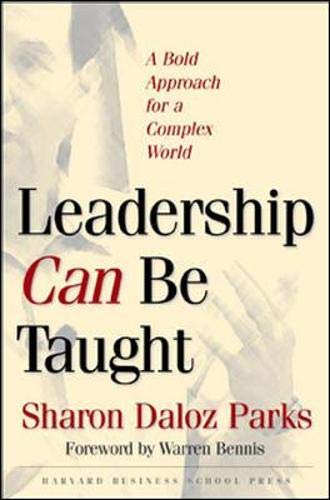Leadership Can Be Taught: A Bold Approach for a Complex World / Sharon Daloz Parks
| List Price: | |
Our Price: $22.78 | |
|
For Bulk orders
| |
|
Used Book Price: | |
| Leadership Can Be Taught: A Bold Approach for a Complex World / Sharon Daloz Parks | |
| Publisher: Harvard Business Review Press | |
| Availability:Usually ships within 2 to 3 days. | |
| Sales Rank: 281189 | |
|
Similar Books
Unlike others who lionize strong leaders and decisive, authoritative personalities, Parks looks for her leadership lessons to Ronald Heifetz, a humble, almost meek instructor at Harvard. The book opens with a transcript of Heifetz's typical class at Harvard, and illustrates his free-flowing banter with students. There's something of a biblical, storybook-like quality to this narrative, as it shows Heifetz's Socratic style in drawing out students and leading them to truths. Heifetz's approach carries over to the book, which has an indirect, oblique style, and shuns the reductionist, simplifying, bullet-point orientation of most business books.
Through the course of the book's nearly 300 pages, Parks argues that leadership is less magical and yet more important than we usually believe. Drawing on Heifetz's ideas, she explains her belief that leaders are formed gradually, over time and through deliberate effort--not born with special traits. Four key themes run through the book: first, that true leadership differs from the kind of formal authority typically conferred by organizations; second, that leaders have less of a role solving technical problems than in helping teams of individuals deal with adaptive challenges; third, that conventional power--meaning authority over people and budget--is less important than "presence"; and fourth, that this mysterious quality of "presence" rests less on innate personality than on a style of interacting with others in an organization.
Parks' concept of presence becomes a key axis on which the book turns. It's an intriguing concept. As she defines it, presence is "the ability to hold steady and to improvise in the midst of the conflict and tumult of adaptive work depends on cultivating an inner consciousness of the connectivity of which one is a part--especially when there is a high degree of voltage on the wires. It requires the ability to recognize and intelligently manage strong feelings--one's own emotions and the motions in others….It requires an understanding of one's self in relationship to audience, the ability to pay close attention, to listen, to feel, and to bring one's own heart-mind into the present…."
Not all of this book rests on such dense academic language. Much of the writing describes anecdotes of students' interactions with Heifetz, as they learn his (and Parks') concept of leadership. Still, this is a challenging work, and not one that all readers will enjoy. Those who enjoy new paradigms of leadership, such as those advanced in Resonant Leadership or The Leadership Wheel, will be best suited for the unusual ideas, and style, of this book. --Peter Han
Now you can buy Books online in USA,UK, India and more than 100 countries.
*Terms and Conditions apply
Disclaimer: All product data on this page belongs to  .
.
No
guarantees are made as to accuracy of prices and information.










